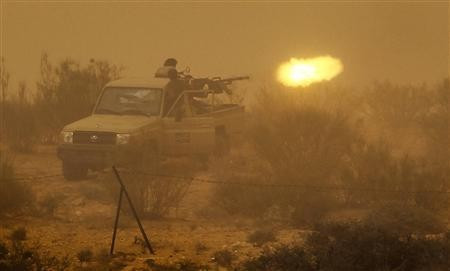Libya Conflict: With the End Looming, What Happens Next?

Since it decided to intervene in March, NATO has been fighting in Libya on the rebels' side. But after months of stagnation, in the last few weeks the conflict appears to have turned in their favour.
According to NATO spokesman, anti-Gadafhi forces are now "assuming control of the key approaches to Tripoli" which represent the "most significant territorial gains for months."
With the fighting now taking place no less than 40km to 60km (25 to 37 miles) from the Libyan capital, the end of the Gadhafi era could be looming.
The rebels, who are fighting for the National Transitional Council (NTC), have now made significant advances on Sorman and Zawiya, two towns on the coastal road linking Tripoli to the Tunisian border.
The town of Zawiya is of capital strategic importance, as Gadhafi's only functioning oil refinery is located there, and reports of the rebels now fighting in the town of Gharyan, in the south of the capital have also emerged.
While reports of anti-Gadhafi forces gaining ground indicate the conflict is shifting in their favour, it is difficult to verify them and the fight for Tripoli is set to be a hard one as it seems unlikely Gadhafi will relinquish power easily.
According to NATO, pro-Gaddafi forces are under greater pressure as they have been pushed out of Misrata to the east of Tripoli, while there have been reports of fighting in Brega, a town located between Tripoli and Benghazi.
The leader however has broadcasted audio messages to bolster his troops and supporters, and has warned he will fight "until the end."
On the other hand, the rebels still lack coherence when it comes to their fighting on the grounds and have shown that they struggle to hold to their advances, having already been pushed back by the Gadhafi forces several times in the past.
The Alliance has upped its bombing campaign on Tripoli in the last few days, targeting command and control sites and areas from which pro-Gaddafi forces have been operating and launching their offensive, putting an added pressure on the Libyan government and its forces.
As the conflict gains momentum, questions about the future of Libya are also raised. If the rebels win, then Gadhafi will not be part of the picture, but who will replace him and what will the Gadhafi free Libya resemble after months of conflict?
If their gains can be consolidated, is this conflict reaching its end game? And if so, how will it end? Will rebel forces move on Tripoli itself or will some kind of deal be done?
Coalition forces say they have been working closely with the NTC on a plan for the immediate aftermath of the conflict, but recent events have cast doubts on the NTC's ability to rule Libya or implement new reforms.
Last month rebel army chief General Abdel Fattah Younis was killed with many suggestung responsibility within the rebel faction, and the NTC was forced to reshuffle its cabinet.
Despite analysts criticising the fact that some of the NTC figureheads had been working with Gadhafi for years, the council only made changes when it felt it had no other alternative.
Reports of the NTC forces violating basic human rights and persecuting sub-Saharan migrants and civilians have also tarnished the reputation of the opposition.
Other countries that have gotten rid of their dictators also do not provide optimistic examples.
Despite Saddam Hussein's death, insurgents in Iraq are still ravaging the country, and killing civilians, while in Egypt, months after Mubarak's demise, protesters are still far from happy with their interim government, the Somalia is still prone to violence despite Siad Barre being ousted twenty years ago.
After fighting for six month, the NTC had better prepared for the next phase as different factions and militant groups could fight for more power and influence.
The aftermath of the conflict will raise a lot of questions and because of NATO's involvement in the power struggle many will also turn to the Alliance for answers.
© Copyright IBTimes 2025. All rights reserved.





















